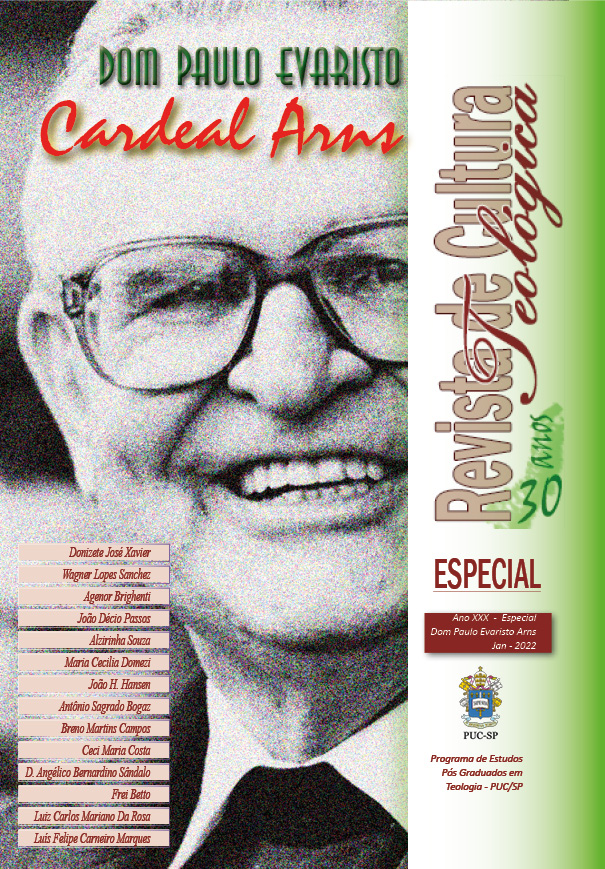Pássaros engaiolados e anjos assassinados
a dimensão profética da arte de Zuzu Angel e a luta de D. Paulo Evaristo Arns pelos direitos humanos (Brasil: nunca mais)
DOI :
https://doi.org/10.23925/rct.iARNS.56034Mots-clés :
Espiritualidade da libertação, protesto político, Zuzu Angel, D. Paulo Evaristo Arns, ditaduraRésumé
Para Wassily Kandinsky (1866-1944), o artista verdadeiro é alguém que põe a vida em movimento, abre caminhos bloqueados, vê e faz ver o que ainda será. Como hipótese de trabalho, portanto, assumimos que a arte possui uma perspectiva profética, sendo assim, nosso artigo aborda a dimensão profética da obra artística da estilista brasileira Zuzu Angel (1921-1976). Tendo perdido seu filho Stuart Edgar Angel Jones (1946-1971), torturado e assassinado por agentes do regime ditatorial brasileiro, ela transformou sua arte em grito de protesto – e realizou aquele que pode ser considerado o primeiro desfile de moda político da história. As roupas com estampas e bordados de pássaros engaiolados e anjos colocados na mira de tanques e canhões, para além do aspecto político em si, eram expressões de uma energia espiritual, que pode ser interpretada em correlação com a espiritualidade da libertação, encarnada na América Latina no âmbito das igrejas cristãs a partir da década de 1960. Em plena ditadura civil-militar no Brasil, os caminhos de Zuzu Angel se entrecruzaram com a vida e a obra de D. Paulo Evaristo, Cardeal Arns (1921-2016) – profeta da esperança e da resistência. O testemunho de ambos é um grito que ecoa na história: “Brasil, nunca mais”.
Références
ANDRADE, Priscila. A marca do anjo: a trajetória de Zuzu Angel e o desenvolvimento da identidade de sua grife. Iara – Revista de Moda, Cultura e Arte. São Paulo, v. 2, n. 2, out./dez. 2009, p. 85-119. Disponível em: http://www1.sp.senac.br/hotsites/blogs/revistaiara/wp-content/uploads/2015/01/05_IARA_vol2_n2_Dossie.pdf. Acesso em: 15/09/2021.
ARNS, P. E. Da esperança à utopia: testemunho de uma vida. Rio de Janeiro: Sextante, 2001.
ARNS, P. E. Em defesa dos direitos humanos. Rio de Janeiro: Ed. Brasília Rio, 1978.
BRASIL: nunca mais. Petrópolis: Vozes, 1985.
BRUEGGEMANN, W. A imaginação profética. São Paulo: Paulinas, 1983.
CONSELHO EPISCOPAL LATINO-AMERICANO. Documentos do CELAM: conclusões das Conferências do Rio de Janeiro, de Medellín, Puebla e Santo Domingo. São Paulo: Paulus: 2004.
CUNHA, M. N. Memória, verdade e justiça: o Projeto Brasil Nunca Mais e a comunicação alternativa nos anos de chumbo no Brasil. Lumina, v. 8, n. 2, 2015. Disponível em: https://periodicos.ufjf.br/index.php/lumina/article/view/21143. Acesso em: 13 out. 2021.
GUTIÉRREZ, G. Beber do próprio poço. Petrópolis: Vozes, 1984.
KANDINSKI, W. Do espiritual na arte. São Paulo: Martins Fontes, 1966.
RODRIGUES, S. G. F.; RODRIGUES, R. G. Lamento angelical em Angélica. In: CAVALCANTE, R. Essas Mulheres: o protagonismo da mulher nas canções de Chico Buarque. São Paulo: Recriar, 2021. p.175-186.
TARKOVSKI, A. A. Esculpir o tempo. São Paulo: Martins Fontes, 1998.
VALLI, V. “Eu, Zuzu Angel, procuro meu filho”. Rio de Janeiro: Philobiblion, 1986.
Téléchargements
Publié-e
Comment citer
Numéro
Rubrique
Licence
© Revista de Cultura Teológica 2022

Cette œuvre est sous licence Creative Commons Attribution - Pas d'Utilisation Commerciale - Pas de Modification 4.0 International.
Os autores concedem à revista todos os direitos autorais referentes aos trabalhos publicados. Os conceitos emitidos em artigos assinados são de absoluta e exclusiva responsabilidade de seus autores.

